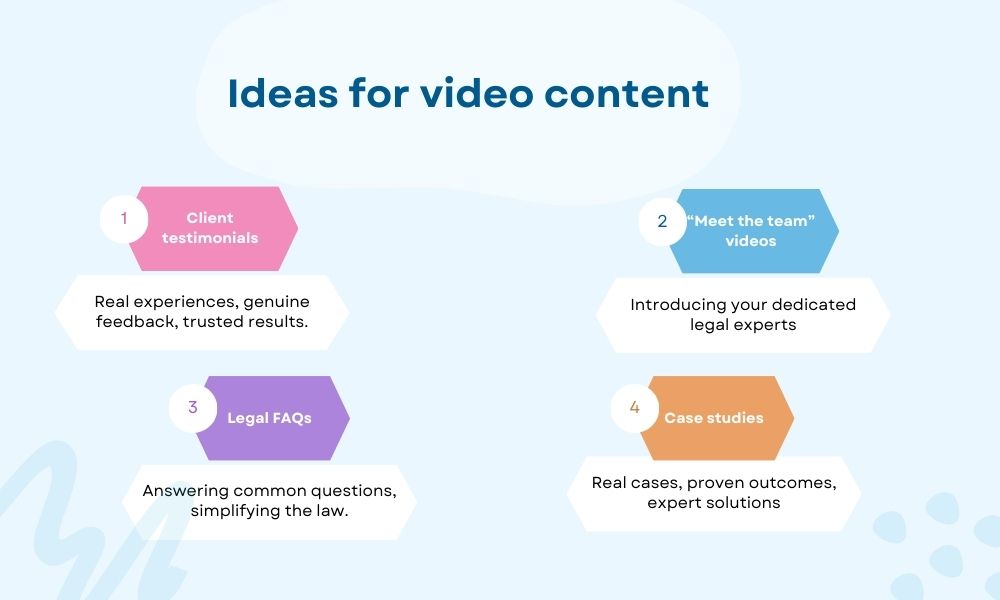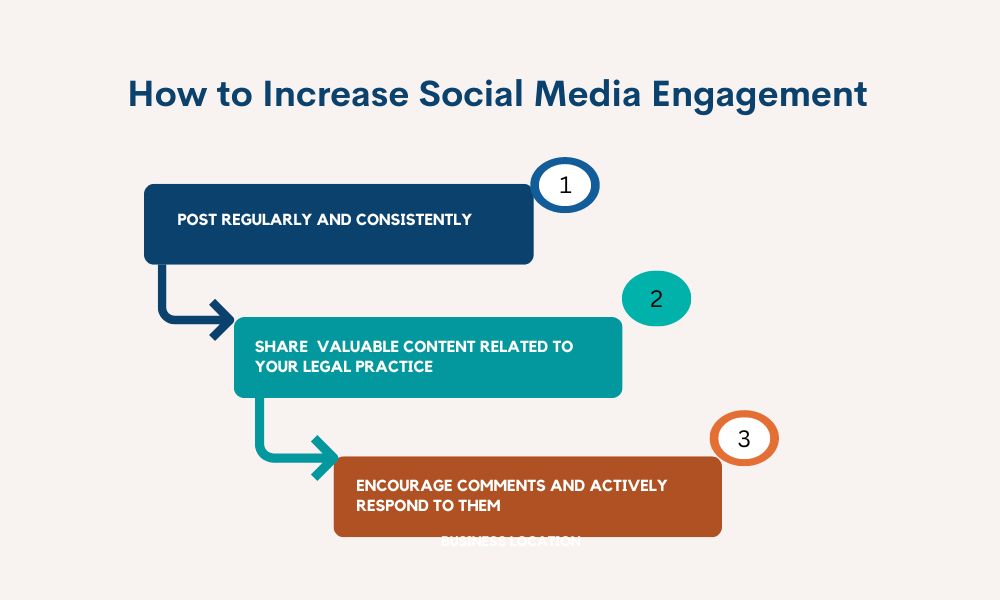Digital marketing is important for law firms to stay competitive in today’s digital-first world. A 2022 survey shows 96% of people seek legal advice through search engines. That means if your firm doesn’t have a solid online presence, you’re missing out on potential clients. This article breaks down how law firms can leverage digital marketing effectively.
Why Digital Marketing for Law Firms
Over 85% of law firms now use digital marketing, making it an essential strategy. The legal industry’s competition is fierce, and traditional marketing like billboards or print ads no longer cuts it. Digital marketing offers cost-effective solutions that reach a targeted audience, helping your law firm get discovered by people actively searching for legal services.
Building a Professional Website
About 74% of users judge a company’s credibility based on its website design. For law firms, a sleek, informative website is non-negotiable. Your website is often the first interaction a potential client has with your firm, so it needs to reflect professionalism and trust.
Here’s what to include on your law firm website:
- Clear navigation
- Contact information on every page
- Case studies or client testimonials
- Practice area pages
Having these elements on your site can increase user engagement and conversions. Keep your site mobile-friendly, as 58% of searches come from mobile devices.
Contact us to design a mobile-friendly website for your law firm.
Search Engine Optimization (SEO) for Law Firms
SEO is essential for getting your website ranked on Google. 75% of users never scroll past the first page of search results. By optimizing your site, you can rank higher for relevant keywords like “personal injury lawyer” or “divorce attorney,” driving organic traffic to your firm.
Key SEO tactics include:
- Using local keywords (e.g., “New York divorce lawyer”)
- Writing informative blogs and articles
- Optimizing images and meta tags
- Building backlinks from trusted sources
SEO isn’t an overnight process, but it’s one of the most cost-effective digital marketing strategies.
Grow Your Business with Search Engine Optimization (SEO) Services
Pay-Per-Click (PPC) Advertising for Law Firms
On average, businesses make $2 in revenue for every $1 spent on Google Ads. Pay-per-click (PPC) advertising allows your law firm to appear immediately on top of search results. While organic SEO takes time, PPC can get you instant visibility.
For law firms, targeting specific keywords through PPC can generate high-quality leads. Ads for keywords like “criminal defense lawyer near me” often convert well because they target people needing legal help.
To set up Google Ads for law firms.
Social Media Marketing for Law Firms
Platforms like LinkedIn, Facebook, and Twitter can help build your law firm’s brand and engage with potential clients. Social media humanizes your firm and allows for direct communication.
Here’s how to use social media effectively:
- Share informative content about your practice areas
- Respond to comments and messages promptly
- Post client success stories (with permission)
Social media isn’t just about posting updates. It’s about building trust and demonstrating your expertise to a broader audience. Engage consistently to stay on your followers’ radar.
Do you want to create engaging social media content for law firms?
Content Marketing: Blogging and Legal Articles
Content marketing is an excellent way to educate potential clients and improve your SEO ranking. You demonstrate your expertise while targeting relevant keywords by writing articles, case studies, and FAQs related to your practice areas.
What to write about:
- Changes in the law
- Common legal questions
- Success stories or case studies
- “How to” guides (e.g., “How to file for divorce”)
Your content doesn’t have to be overly complicated. Stick to what your clients ask about the most and ensure your articles are easy to read.
How to write SEO-friendly legal content?
Email Marketing for Law Firms
Did you know that email marketing has an average ROI of 4200%? Email marketing is a cost-effective way for law firms to nurture leads and stay connected with clients. Sending regular newsletters or updates helps keep your law firm top-of-mind when someone needs legal services.
Here’s how to use email marketing:
- Segment your email list based on practice areas
- Send educational content or legal updates
- Include a call to action like booking a consultation
Be sure to personalize your emails and avoid spamming your audience. Use email to inform rather than hard sell.
Local SEO and Google My Business
By optimizing your Google My Business profile, you can appear in local search results and Google Maps.
Your Google My Business profile should include the following:
- Your law firm’s name, address, and phone number
- Hours of operation
- Client reviews
- A description of your services
Updating this profile and gathering reviews can improve your local search ranking and drive more foot traffic to your office.
How do you optimize your Google My Business profile?
Video Marketing for Law Firms
Video content is 50 times more likely to drive organic traffic than plain text. Law firms can use videos to explain complex legal topics digestibly. Video marketing builds trust and increases engagement, especially when you present information about the legal process or answer common questions.
Posting videos on your website, YouTube, and social media channels increases your reach. Keep the content informative and short to maintain the audience’s attention.
Online Reviews and Reputation Management
In today’s digital age, consumers heavily rely on online reviews to make decisions, and legal services are no exception. For law firms, these reviews can make or break your reputation. Since clients often seek legal assistance during stressful times, they look for trustworthy professionals. Positive online reviews help establish that trust, making reviews a critical part of your digital marketing strategy.
Encourage Satisfied Clients to Leave Positive Reviews
After successfully handling a client’s case, it is important to ask them to leave a review on platforms like Google and Yelp or specialized legal directories such as Avvo. Happy clients are usually more than willing to leave a positive review but often need a reminder. This helps build a robust online reputation, and the more positive reviews you have, the more likely potential clients will trust your services.
Best Practices to Get Positive Reviews:
- Politely ask for a review during your last interaction.
- Send a follow-up email with a direct link to your review page.
- Consider using automated review platforms to make it easier for clients to leave feedback.
Respond to Negative Reviews Professionally
Negative reviews are inevitable, but how you respond to them can enhance your firm’s reputation. A professional, empathetic response can turn a negative experience into a neutral or positive one. Avoid getting defensive or emotional in your replies. Instead, offer to resolve the issue and ask the reviewer to contact your office to discuss their concerns further.
Steps to Respond to Negative Reviews:
- Thank the reviewer for their feedback.
- Acknowledge their concerns.
- Offer a solution or encourage further conversation offline.
Handling negative reviews demonstrates your firm’s commitment to client satisfaction and can increase your credibility.
Monitor Mentions of Your Law Firm Online
Staying on top of what people say about your firm online is essential. Regularly monitoring reviews and mentions on Google, social media, and other platforms helps you address issues before they escalate. Many tools, such as Google Alerts or reputation management software, can notify you whenever someone mentions your law firm online. This proactive approach allows you to respond quickly and maintain control of your online reputation.
How to Monitor Your Online Reputation:
- Set up Google Alerts for your firm’s name.
- Use reputation management software to track mentions.
- Regularly check reviews on Google, Yelp, and other directories.
By actively managing your online reputation, you can improve your law firm’s standing and attract more clients. Maintaining a positive online presence is crucial since many clients read reviews before contacting a lawyer.
Tracking and Analytics for Continuous Improvement
Digital marketing is not a one-time effort but a continuous process that requires regular monitoring and adjustments. Firms that track their campaigns using analytics tools see a 27% higher return on investment (ROI). By monitoring key performance indicators (KPIs), your law firm can identify what’s working and needs improvement.
Website Traffic and Sources
Monitoring website traffic is essential to understanding how potential clients find you online. Google Analytics provides insights into where your visitors come from, whether through organic search, paid ads, social media, or referrals. Knowing which traffic sources drive the most visitors helps you allocate your marketing budget more effectively.
Key Metrics to Track for Website Traffic:
- Number of visitors per day, week, or month.
- Traffic sources (organic, paid, social media, referrals).
- Top-performing pages on your website.
If you notice that most of your traffic comes from search engines, you may want to invest more in SEO. If PPC performs well, consider increasing your ad spend to drive more leads.
Conversion Rate from Leads to Clients: Digital Marketing For Law Firms
While website traffic is important, converting those visitors into actual clients is the ultimate goal. Conversion rate refers to the percentage of website visitors who take a desired action, such as filling out a contact form or scheduling a consultation. Tools like Google Analytics and customer relationship management (CRM) systems help track these conversions.
How to Improve Conversion Rates:
- Optimize your landing pages for clarity and ease of use.
- Add clear calls-to-action (CTAs) on every page.
- Ensure your contact forms are simple and easy to fill out.
By improving your conversion rate, you maximize the effectiveness of your marketing efforts and get more clients from the same number of website visitors.
Cost Per Lead for PPC Campaigns
Pay-per-click (PPC) advertising can generate high-quality leads for law firms, but tracking how much each lead costs is crucial. The price per lead (CPL) is the total amount you spend on ads divided by the number of leads generated. Lowering your CPL while maintaining or increasing lead quality improves the efficiency of your advertising campaigns.
Ways to Lower Cost Per Lead:
- Focus on long-tail keywords that have lower competition.
- Refine your ad targeting to reach the right audience.
- A/B tests different ad copy and landing pages to find what works best.
Tracking the CPL helps you determine whether your PPC campaigns are worth the investment and what adjustments can improve performance.
Engagement on Social Media Posts
Engagement refers to how your audience interacts with your content on social media platforms. This includes likes, shares, comments, and clicks. High engagement signals that your content resonates with your audience and can increase your visibility on platforms like Facebook and LinkedIn.
Tracking engagement helps you understand what type of content performs best, allowing you to create more posts that drive results. Tools like Hootsuite and Facebook Insights can provide detailed analytics on your social media performance.
Use Data to Refine Your Digital Marketing Strategy for Law Firms
The data you collect from tracking your website, ads, and social media should guide future marketing decisions. For example, if a specific blog post attracts a lot of traffic, consider writing more content on similar topics. If a PPC campaign is underperforming, try adjusting your targeting or ad copy.
By analyzing the data regularly, you can make informed decisions that improve your digital marketing strategy. This helps optimize your budget, improve ROI, and attract more clients to your law firm.
Final Words for Digital Marketing For Law Firms
Digital marketing is an indispensable tool for law firms aiming to attract more clients and grow their practice. From creating a user-friendly website to leveraging SEO, PPC, and social media, there are numerous strategies to explore. By focusing on what works and continuously optimizing your efforts, your law firm can see measurable growth in online visibility and client acquisition.
Visit our case studies page to learn how our digital marketing services can help your law firm grow and attract more clients.
Law firms that embrace digital marketing will position themselves for long-term success in an increasingly digital world. Start today, and watch your client base grow through targeted, effective online strategies.
Read More ⇒












